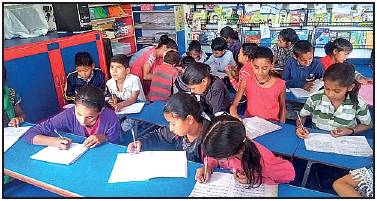Uttarakhand: Libraries
This is a collection of articles archived for the excellence of their content. |
Rural libraries
As in 2019
Prashant Jha, Oct 20, 2019: The Times of India

From: Prashant Jha, Oct 20, 2019: The Times of India
The school bell announces the end of the day and 10-year-old Sarita quietly settles down in a nook of the class to open a book. She struggles with some words in “Dum Dum Ki Kursi”, a collection of rhymes by Usha Chhabra, and turns to her friend Sachin for help. Together, both of them are able to pronounce the words, and their faces light up with a smile. The Class 4 students at a government primary school in Uttarakhand’s Poth village are the first in their families to read.
Children in cities may be falling out of love with books, but libraries are sprouting in some of the remotest villages in the Himalayan hills, training first-generation learners.
Seema Jaunsari, director (academic research and training), Uttarakhand, said that 1,647 libraries in schools — several of them in the remote hills — have been set up since 2007 in eight districts.
‘Here, children tell bedtime stories to parents’
My parents have never even seen a book. Here, it’s the children who tell bedtime stories to their parents,” said Sarita, who was born into a family of Ban Rawats — an ethnic minority group in Uttarakhand — in Champawat district’s Poth village, at least 15km from any motorable road.
Her teacher — the lone one at school — Dhanesh Kumar Dhyani said about 21 students are “members” of the library which started functioning out of the government school in 2017. Collection of short stories and poems in Hindi are among the most popular among children.
“Most families in the village are involved in smallscale farming or sell timber. The men and women here can’t write their names, but their children can. Reading different types of books is helping students read and understand better as well as aiding their mental development. Today, many of them can read over 60 words per minute with ease, it was not like this before,” he said.
The library at Poth with over 700 books, set up with the help of Room to Read, a nonprofit focused on children’s literacy, has helped students inculcate the habit of reading as well as allowed them to have dreams. Sarita wants to be a teacher when she grows up so she can teach children the importance of reading.
About 500km away in Pilang village of Uttarkashi district, nine-year-old Mohit Rana is learning the nursery rhyme “Twinkle Twinkle Little Star”. So far, he has memorised the first two lines. “Earlier, I didn’t know how to read so I used books for colouring. But now I’m reading them.”
The village, 16km from the nearest motorable road, still has no internet or newspapers. Mohit’s teacher Atar Singh said having a library here was an extraordinary thing. “The books here have been read by dozens of students since the library was set up in 2011. On an average, each student issues 30-35 books annually and returns them with care. We have books like Panchatantra, Tenali Rama, Cinderella and Akbar Birbal.”
How were the libraries set up in these remote villages? “The books had to be carried on mules or porters. It took some time for bags after bags to be transported to these farflung villages through dense forests prone to animal attacks,” said Pushplata Rawat, state coordinator for Room to Read.
Some individuals have also turned librarians. In Nainital’s Seem village, couple Jaya and Atul Shah have been running a library since 2016. The library which started with just 15 books now has several hundreds and even a computer lab for children. Jaya, who managed a centre for kids with special needs in Ahmedabad, told TOI, “My husband, a civil engineer, and I were born in Uttarakhand and retired to the hills. One day, I asked some of the children in the village if they would like to come to my house and read. We were overwhelmed to see 35 students turn up on the very first day. These students would otherwise help their parents rear goats but now they have started to read fluent Hindi and are also singing English songs.”
Jaya added, “One of our avid readers is Kanchan who has been with us from day one. Her parents are illiterate but she borrows a book every week and reads them to her mother while she cooks.” Some of the books have colourful illustrations to keep students hooked. “We wanted to get students interested in at least picking up the books,” said added Saktibrata Sen, programme director, Room to Read.